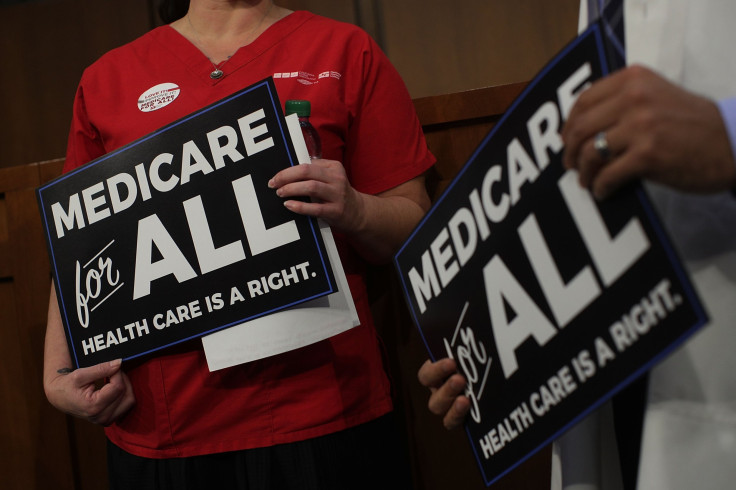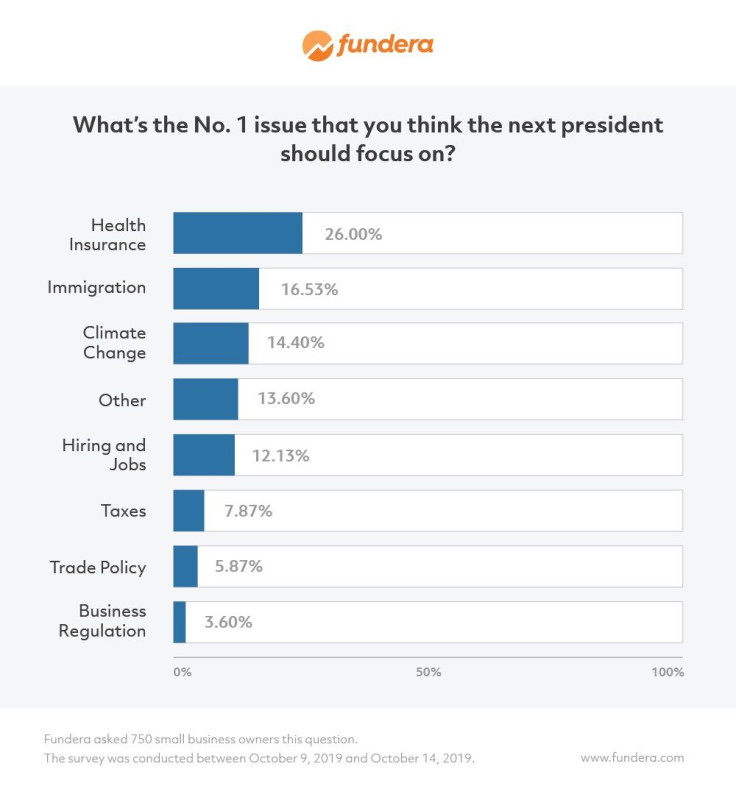Small Businesses Say Health Insurance, Immigration, Climate Change Leading 2020 Issues

A survey of small business owners by small business financial marketplace Fundera indicates the top issue in 2020 will be health insurance, following by immigration and climate change, giving Democratic candidates an opening to lure moderate Republicans if they make accommodations for small businessmen.
The survey of 750 business owners with fewer than 501 employees indicated small business owners are split over who they want to see in the White House a year out from the 2020 presidential election, but they agree certain issues should take center stage.
The survey was released Thursday.
Small businesses make up 99.9% of all U.S. businesses, numbering more than 30 million and employing nearly half of all U.S. workers. The Bureau of Labor Statistics projects the number of self-employed workers will grow to 10.3 million by 2026 from 9.6 million in 2016.
Health insurance was named as the top issue facing candidates at 26%, followed by immigration (16.5%), climate change (14.4%), hiring and jobs (12.1%), taxes (7.8%), trade policy (5.8%) and business regulation (3.6). Thirteen percent of those surveyed said they were more concerned about another issue.

“Given these results, candidates have an opportunity to frame the top issues in business terms to attract the support of small business owners,” Fundera said. “Health insurance, as it is currently administered, is very time-consuming for small businesses. Even after passage of the Affordable Care Act (ACA), small business owners spend an estimated 13 hours each month administering group health insurance. This expended time equates to more than $13,000 each year.”
Small business owners support creation of a public option, with strong Democrats leaning toward a Medicare-for-all program.
Likewise, immigration impacts hiring and pay scales, presenting a daily challenge for business owners.
Among those who placed health insurance at the top of the list, most identified as Democrats or independents while Republicans made it their No. 2 issue behind immigration.
Immigration and climate change sentiment was more split along party lines with 62% of Republicans naming immigration as the top issue for the next president compared to 6% of Democrats. Twenty percent of Democrats and 6% of Republicans characterized climate change as the top issue.
Those surveyed said enacting tax cuts and tax incentives would be the most important thing the next president could do to help them improve their financial situation.
Moderate Republicans indicated they would not oppose an increase in the corporate tax rate or on wealthy individuals.
“Small business voters who lean Republican were in favor of such policies, as long as there are exemptions for small businesses. Forty-five percent of small business owners who lean Republican were in favor of raising the corporate tax rate if there are exemptions for small businesses. Without exemptions, support among moderate Republicans falls to just 5%,” Fundera said.
More than one-in-five moderate Republicans (22%) support a national $15 minimum wage, with the overall survey posting 43% support.

When it comes to the presidential candidates, independents will likely be the key to who wins the White House. President Trump gets 26% support of their support. Though those surveyed indicated they preferred the Democratic field to Trump, none of the candidates outpolled Trump. “Other” led leading Democrat Joe Biden by 6 points among independents. Among strong Democrats, Elizabeth Warren led the field (29%), followed by Biden (24%) and Bernie Sanders (21%). Few Republicans voiced any support for Warren while moderate Democrats sided with Biden.
Asked how they would vote come election day, 35.6% said they would vote Democratic while 30% said they would vote Republican and 25% said they were unsure.
The survey was conducted Oct. 9-14 and had an error rate of 3.65%. Of those surveyed 34.26% described themselves as Democrats, 32.8% as independents and 32.95% as Republicans. By gender, 51% were men and 49% women, with 47% ages 18-44 and 52% over 45.
© Copyright IBTimes 2024. All rights reserved.





















